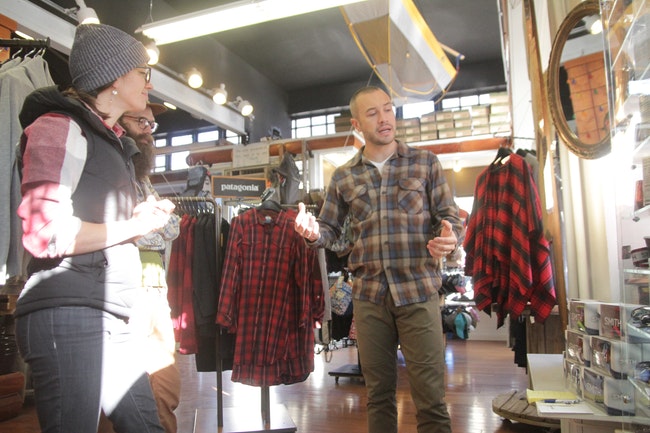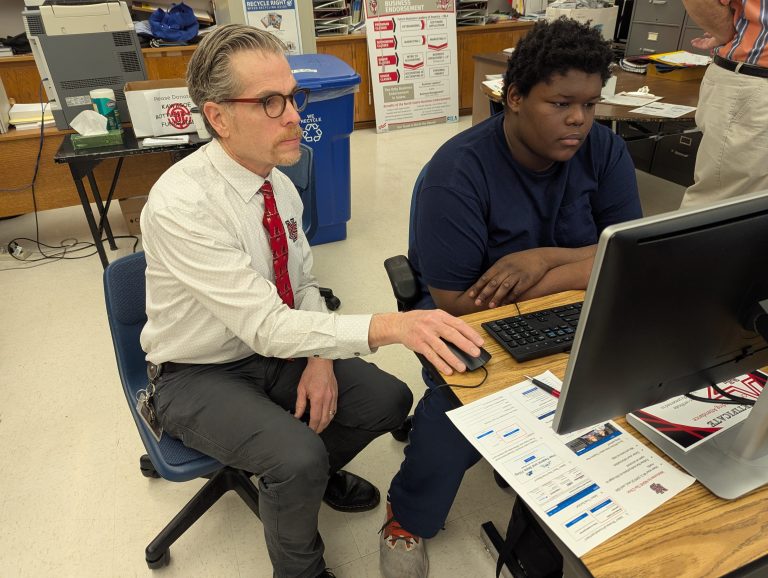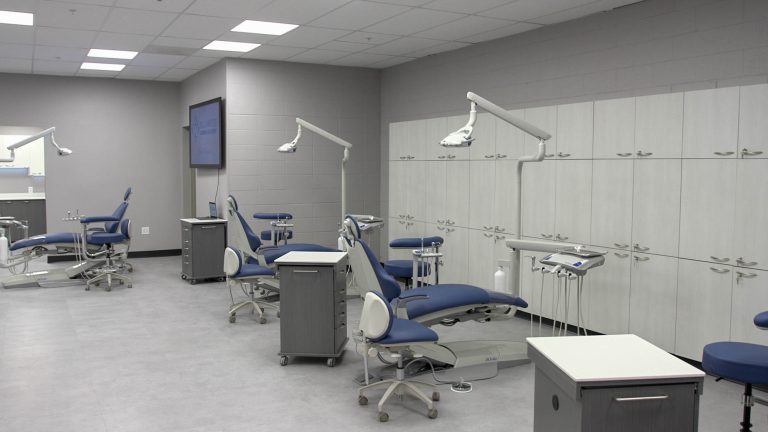
Jim Whitbeck, right, discusses a display Friday with Carolyn Brandt and Eric Lincolnat his business Blue Mountain Outfitters in La Grande. The business is going on 5 1/2 years of growth. (Ronald Bond/La Grande Observer)
It’s a good time to be a holiday shopper in Oregon.
Despite fears of a recession earlier this year, Oregon’s economy remains stronger than much of the country. Unlike a decade ago, when the economy was reeling from a recession, Oregonians have jobs and money. That puts them in a better position to be generous this holiday season.
Hovering at 4%, the state’s unemployment rate is at historic lows. Oregon had the second-fastest growing median income in 2018. At 13%, Oregon’s poverty rate is below the national rate and the lowest since 2000.
“We’re in unprecedented times right now,” said John Topagna, president and economist at Portland-based consulting firm ECONorthwest. “We’re in the eleventh year of an economic expansion, and no other Americans have ever lived through that.”
While Oregon’s economic indicators are strong going into the busiest shopping season of the year, there are signs that trouble some economists. There have also been some blips in the otherwise strong economy that resulted in job losses.
Still, local shoppers, retailers and bankers remain optimistic going into the holidays.
[ Help build Salem Reporter and local news – SUBSCRIBE ]
Umpqua Bank, a regional bank with branches across Oregon, reports strong consumer confidence. Annette Campista, a senior vice president at the bank and regional director of business banking, said she’s seen an increase in business loan applications, an indicator of economic health.
Campista said the bank has seen an uptick in consumers saving. She said many customers have leveraged low interest rates to refinance their homes and consolidate debt.
Jeff Bailey, the president and CEO of the Heppner-based Bank of Eastern Oregon, similarly reported increases in deposits, “steady to better” activity on loans and overall faith in the economy despite the threat trade wars pose to the region’s agriculture.
“From a national perspective, consumer spending is still very strong,” said Bailey. “In small towns in rural Eastern Oregon, it’s pretty much the same.”
He said he expects a good year for merchants.
“All in all, consumers are fairly optimistic,” said Bailey. “They’re feeling good about their own financial situation.”
Pat O’Connor, regional economist at the state Employment Department, said that while Oregon tends to have a tougher time during recessions, its economy tends to outpace the rest of the country during expansions. But he said that the high growth that Oregon and the rest of the country have experienced in recent years is starting to slow.
Earlier this year, the economy showed signs it was teetering on a recession. While fears of a recession didn’t materialize, the economy is still showing signs of slowing. Businesses are investing less, and hiring has slowed.
“Growth has slowed in 2019 and downside risks remain elevated,” wrote Josh Lehner, an economist with the Oregon Office of Economic Analysis, in a summary of the state’s most recent economic forecast. “However, a recession is not yet seen in the data.”
O’Connor said that business investment is down, possibly because of decreased demand or uneasiness over the trade wars. The slowdown isn’t surprising, he said. He attributed the tight labor market to employers running out of people to hire.
“I think that’s the biggest change over the past years,” said O’Connor. “But if you have to have some slow growth, it’s good to have it at record low unemployment.”
He said that the economy has been propped up by consumers with more money to spend. Earlier this month, economic research firm Moody’s Analytics noted that “the consumer is shouldering all the burden in preventing the slowing from turning into something worse.”
RUNNING OUT OF GAS
Private economists don’t paint quite as rosy a picture as the state’s analysts. Both Tapogna and fellow ECONorthwest economist Bob Whelan warn there are a few signals that the U.S. is headed for a recession. They’re warning consumers and business owners alike to tread lightly.
“Retail sales are surprisingly weak. To me it looks like the economy is running out of gas,” Whelan said. “If I were a retailer, hotelier, restaurateur; I’d be cautious.”
When assessing the economy’s strength, Whelan looks at indicators including consumer spending, debt, manufacturing and agricultural production, population growth, employment and housing development. He believes consumer spending is particularly illustrative of the economic health because it accounts for about two-thirds of the economy, the other third being made up of mostly government spending.
According to Whelan, reports from national retailers provide some insight into how Oregon retailers might be faring and what they can expect in the coming months.
Kohl’s is one company that provides a good snapshot of how much average consumers are spending at a point in time, Whelan said, because the retailer serves a decidedly middle-class demographic.
Kohl’s could serve as a red flag for Oregon’s retailers. Two weeks ago, the stock fell nearly 25 percent in one day after reporting poor performance in the third quarter and projecting a bad outlook for the holidays.
Whelan also warned that consumer spending has relied on credit, particularly in the mortgage and auto industries. Defaults on car loans are at a 20-year high, meaning that consumers are presuming too much about the future economy and using credit terms that outlive their cars. These are signs that a recession could be on the horizon, he said.
“Don’t borrow a lot of money and cut back (on spending),” Whelan said. “That’s what I would tell consumers and business owners right now.”
According to Lance Rudge, Portland market leader for U.S. Bank, Americans will be wary of how political shakeups at the state and national level in 2020 might affect both their businesses and their pocketbooks.
“The economy and job market are strong, but we are seeing that small businesses are hesitant to take on more debt with the consequences from 2008 still in mind,” Rudge said.
For now, Rudge said, “We expect a good holiday shopping season.”
RISING PRICES
The Trump administration’s trade wars pose a particular threat to Oregon, which relies heavily on exports. The state’s economic forecast identified slower growth in construction, hospitality, business services and durable goods. It also found that employers are posting fewer help wanted ads and that business investment is down.
Whelan and Tapogna indicate tariffs have actually hurt Oregon worse than what’s previously been reported, particularly in the areas of manufacturing and agriculture.
Overall, manufacturing employment in Oregon is declining, and increased taxes on products like hazelnuts, timber and microprocessors have caused headaches for farmers, loggers and tech giants alike. Outside of those industries Oregon has fared well, according to Tapogna, but prices for certain imported products continue to rise and put the burden on consumers.
“Oregon is sort of in the middle of the pack of all states. We’re not as adversely affected as some of the state’s in the middle of the country by the export aspect of trying to sell things into China, but on the other side, in terms of tariffs for things coming into the country, it’s putting upward pressure on prices,” Tapogna said.
HOLIDAY SALES
Oregon business owners, however, are feeling confident in the state’s economy heading into the holidays and the sales season ahead.
“I’m anticipating it will be exceptional,” said Bob Neher, owner of Clay in Motion, a pottery shop in Milton-Freewater, outside of Pendleton. “Everyone is upbeat.”
Randy Smith, co-owner of Smitty’s Ace Hardware and Smitty’s Outpost in Hermiston, said he mostly sells things people need more than want, a protection that insulates his business from seeing as many highs and lows as other retailers.
Smith is expecting a strong holiday shopping season, but he said that circumstances feel different for retailers now than it did three to five years ago. He said that Black Friday deals now span a month.
“Truthfully they kind of ruined Black Friday,” he said. “It’s not a huge peak. You don’t have the same excitement.”
Mark Bigej, owner of Al’s Garden and Home in Wilsonville, confirmed Smith’s sentiment. He’s noticed that consumers are ready to shop for the holidays sooner and sooner each year rather than waiting for Thanksgiving weekend.
“We’re a little bit anxious about the fact that Thanksgiving is a week later and there’s a compressed shopping time between Thanksgiving and Christmas,” Bigej said. “That’s worrisome when we lose a solid week. Right now, consumers seem to be ready for Christmas and are shopping early. We’re seeing more consumer spending this year than last year, and we’re hoping that continues.”
Going into the holidays, local retailers face challenges from online retail giants like Amazon, as well as what could be a particularly snowy winter for the state. Retailers seem confident that local consumers will continue to spend if they cater to their needs and inclement weather doesn’t ruin shopping days.
In Baker City, Betty’s Books receives freight three times a week to try to rival the convenience many seek by online shopping and continues to have shopper year-round.
“We have one day (shipping) sometimes,” said Carolyn Kulog, owner of Betty’s Books, which has been open 40 years.
In La Grande, Blue Mountain Outfitters owner Jim Whitbeck has shifted marketing away from tourism to a larger focus on the local scene at his outdoor equipment store. Whitbeck said people are surprised a business like his, which sells medium- to high-end outdoor products, can compete with retail giants.
“The one thing I have to say is I never knew a world without Amazon,” Whitbeck said.
Marie LeRud, owner of Lake Oswego’s Lucky Me Boutique, has turned to creativity to bring more customers into her brick-and-mortar store in the age of online shopping. She offers free gift wrapping during the holiday season, something that sets her apart in the minds of customers deciding where to buy.
“I’m a big-themed kind of person. You don’t get that online. You have to be creative in the way of getting your customers wanting to come into the store,” LeRud said.
Some business owners aren’t looking to the economy as a barometer for sales, they’re looking to the skies as forecasts predict snowy weather for the state. The confidence in Oregon’s economy seems to diminish at the prospect of snow.
Will Peters, manager of Annie Bloom’s Books in Multnomah Village, said snow or ice in the Portland area hits retailers hard. That’s particularly troublesome during a season that can make or break a small business’ annual revenue.
“Weather, that’s always the unpredictable thing. (But) we’ve had people come in on cross country skis,” he said. “It’s a shorter season, and we’re planning for that. But overall, I think it will be solid.”
 Hannah Johnson, an assistant store manager with Tender Loving Empire, readies a display for holiday shoppers at the retailer’s flagship store at Southwest 10th Avenue in downtown Portland. (Stephanie Basalyga/Business Tribune)
Hannah Johnson, an assistant store manager with Tender Loving Empire, readies a display for holiday shoppers at the retailer’s flagship store at Southwest 10th Avenue in downtown Portland. (Stephanie Basalyga/Business Tribune)
Jared Mees, co-owner of indie record label Tender Loving Empire, said the unique niche of his business means it doesn’t have to compete with online retailers. The label operates a handful of stores in the Portland area offering records, apparel, housewares and other unique items.
Although Mees doesn’t worry about losing sales to the internet, he’s been anxiously tracking weather forecasts that predict at least one or two snowstorms during the next couple of weeks. For Tender Loving Empire, inclement weather can turn a $5,000 day for sales into one with just $300 or $500 in the register at closing time.
“If there’s a ‘snowpocalypse,’ it can deter (shoppers), and you don’t get those days back. It’s like every retailer … this is your time to profit. Once Dec. 24 hits, it’s over,” Mees said.
Contributors to this report: Joseph Gallivan, Portland Tribune; Jade McDowell, East Oregonian; Phil Wright, La Grande Observer; Jayson Jacoby, Baker City Herald; Stephanie Basalyga, Business Tribune; Clara Howell, Lake Oswego Review; Corey Buchanan, Wilsonville Spokesman.
Reporter Jake Thomas: [email protected]; reporter Saphara Harrell: [email protected]; reporter Sam Stites: [email protected].




